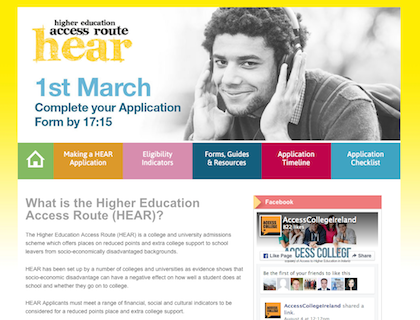HEAR is a college and university admissions scheme for school leavers from socio-economically disadvantaged backgrounds
The Higher Education Access Route (HEAR) is a college and university admissions scheme which offers places on reduced points and extra college support to school leavers from socio-economically disadvantaged backgrounds who have completed an Irish Leaving Certificate. HEAR has been set up by a number of colleges and universities as a result of evidence that has shown that long-term poverty can have a negative effect on how well a student does at school and whether they go on to college.
Which colleges participate?
Participating colleges can be viewed by clicking this link http://accesscollege.ie/hear/participating-colleges/
What are the benefits of the HEAR Programme?
Reduced Points Places: Each college has reserved a number of places for HEAR students at lower leaving cert points.
Extra Support: Extra academic, personal and social supports while at college.
Who can apply?
School leavers, under the age of 23, as of 1st January 2015 who have completed their Leaving Certificate exams. In order to apply applicants must meet a range of financial, social and cultural indicators to be considered for a reduced points place and extra support.
How do I know if I’m eligible to apply to HEAR- what criteria are used?
HEAR applicants must meet a range of financial, social and cultural indicators to be considered for a reduced points place and extra college support.
Indicator 1 – Low Income
Is the household income below the HEAR Income threshold in 2013?
Indicator 2 – Medical Card
Is the applicant or his/her mother/father/guardian in receipt of a medical card (in date on 31st December 2014)?
Indicator 3 – Social Welfare
Is the applicant’s mother/father/guardian in receipt of a means-tested social welfare payment (for a minimum of 26 weeks in the relevant year)? 2013
Indicator 4 – Socio-Economic Grouping (based on occupation and employment status)
Is the applicant a member of a group underrepresented in higher education?
Indicator 5 – DEIS School
Did the applicant attend a school part of the Department of Education & Science “DEIS” scheme (Delivering Equality of Opportunity in Schools) for the duration of their second level education?
Indicator 6 – Geographical Area
Does the applicant live in an area of concentrated disadvantage?
The combinations for eligibility are:
- INDICATOR 1 plus 2 plus 4 or 5 or 6
- INDICATOR 1 plus 3 plus 4 or 5 or 6
- INDICATOR 1 plus 4 plus 5 or 6
- INDICATOR 1 plus 5 plus 6
How do I apply?
Students can apply online at the CAO website from 5th November 2014. As part of the application process, and depending on individual circumstances, applicants will be asked to submit documentation relating to their parent(s)/guardian(s) or to themselves to support their application. Applicants must be able to clearly document household income in the year specified.
Further information on the type of supporting documents required is available on pages 24 to 29 (the Supporting Document Section) of the HEAR Application Guide.
All supporting documents must be returned to the CAO no later than 1 April 2015. Late documentation will not be accepted.
For further information on how to apply and to download forms, guides and resources to help you with your HEAR application please visit this link http://accesscollege.ie/hear/forms-guides-and-resources/.
For further information on the HEAR programme please visit http://accesscollege.ie/hear/.


